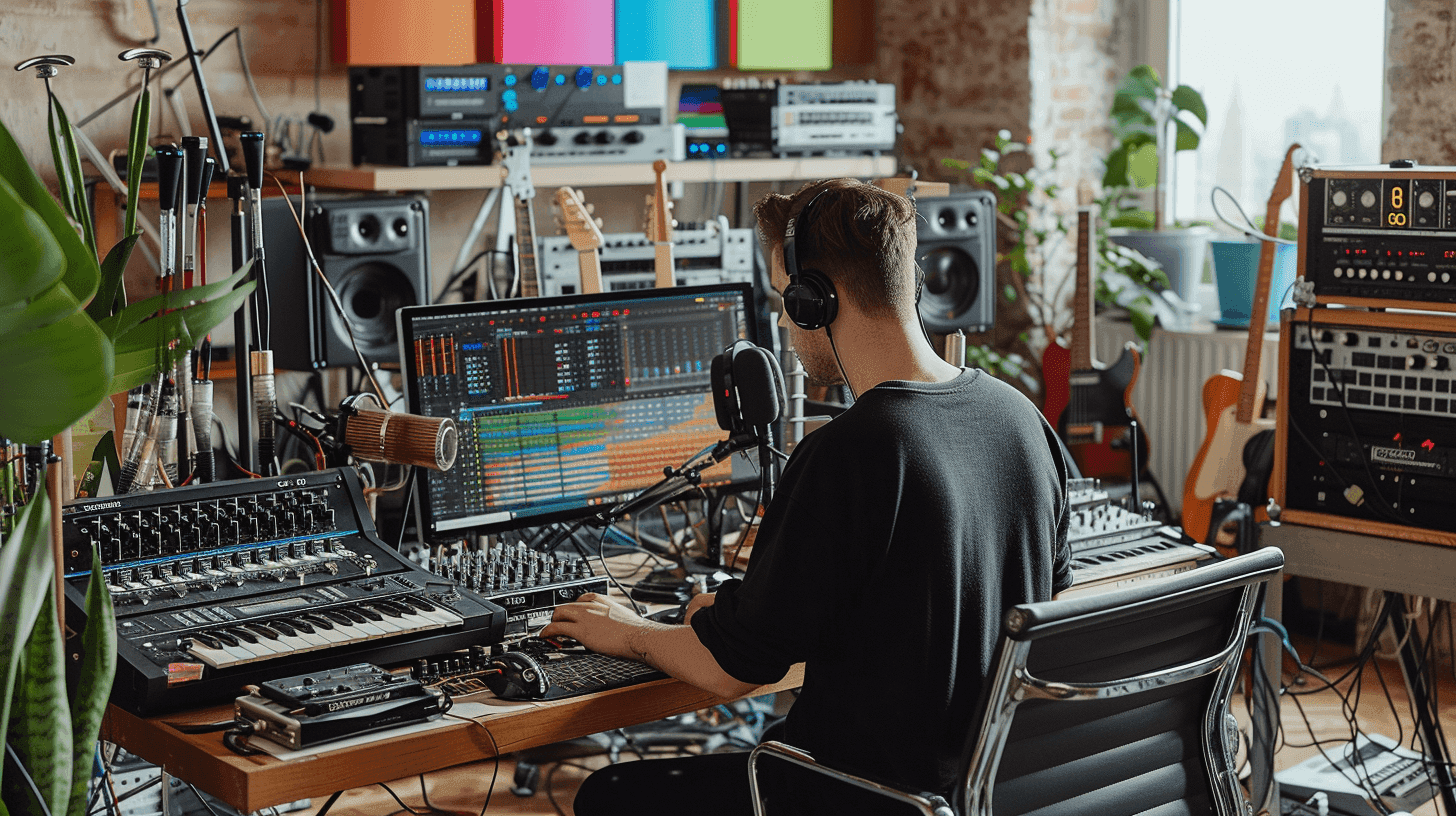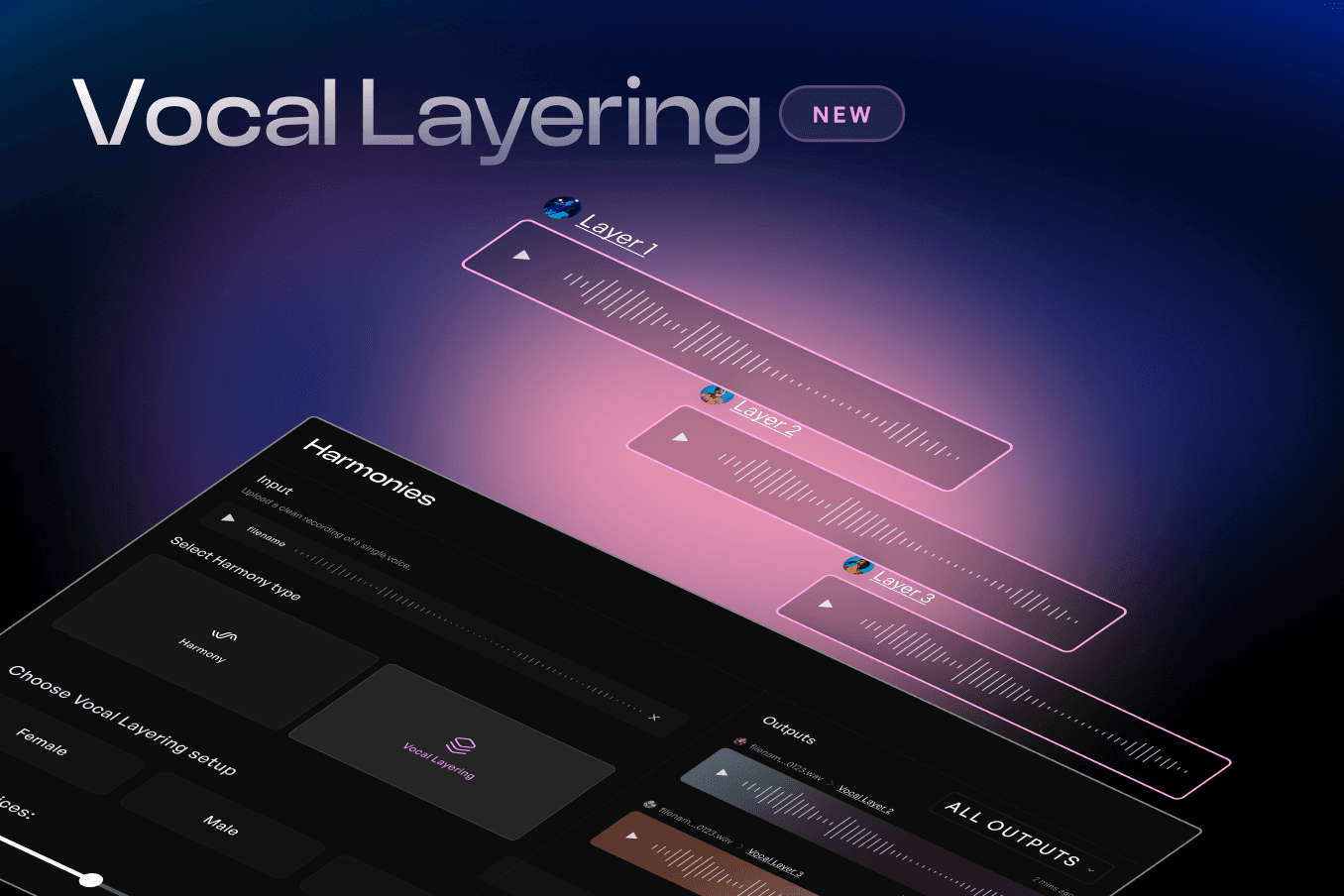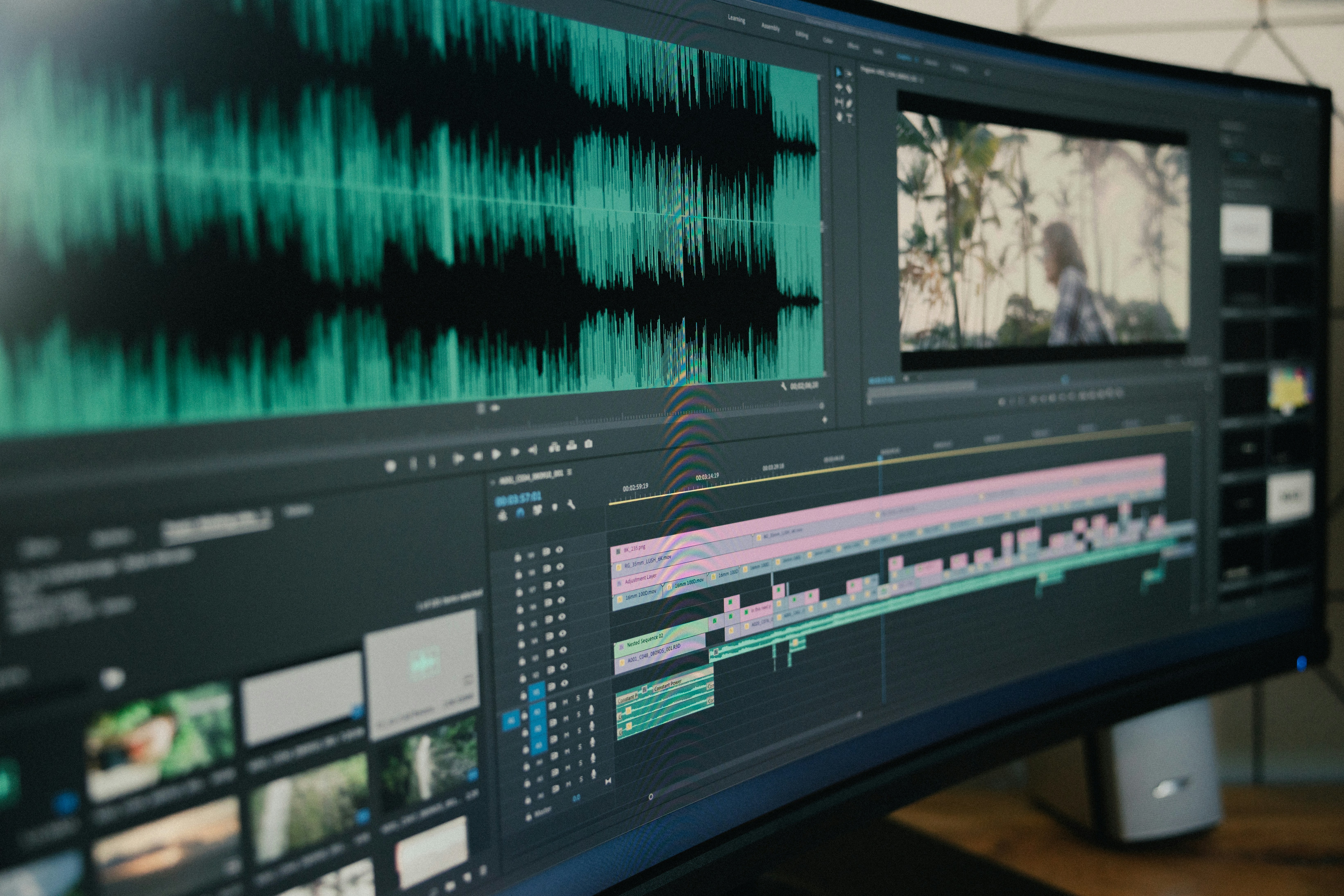The Pros and Cons of AI in Music Production
Written by
Published on
February 2, 2024
The Rise of AI in Music Production
The intersection of artificial intelligence and music production has been a hot topic for debate in recent years. With the rapid advancement of technology, AI has infiltrated the realm of creative arts, particularly music, and has been met with both enthusiasm and skepticism.
The music industry is witnessing a significant shift towards the integration of AI in various production processes. A study by the music distribution company Ditto discovered that almost 60 percent of artists are already incorporating AI into their music projects. This reflects a growing trend where the tools once reserved for the technologically elite are now accessible to a wider range of creators.
Future predictions suggest that AI will claim up to 50% of the music industry market by 2030. The AI music generation market alone is expected to reach a valuation of $1.10 billion by 2027, growing at an impressive CAGR of 41.89%. This growth is indicative of the transformative impact AI is having on the industry.
Voice cloning technology, a subset of AI applications, has also seen a rise, becoming more powerful and prevalent across different sectors including music. The technology's ability to generate vocals that are indistinguishable from human singers has unlocked new frontiers for producers and artists alike. Notably, the collaboration between Google and Universal in offering artist voice licensing for AI-generated music signifies a major step forward in this domain.
Pros of AI in Music Production
Cost Efficiency and Accessibility
One of the more significant advantages of AI in music production is its cost-effectiveness. Traditional recording equipment can be prohibitively expensive, but AI music generators, which are software-based, present a more affordable alternative. This democratizes the music production process, allowing producers on a budget to achieve professional sounds without the hefty price tag. Kits AI, for instance, offers an AI voice generator toolkit that enables musicians to create, train, and use custom and official artist AI voices, further expanding the creative possibilities.
Furthermore, royalty-free AI voices offer unique advantages in terms of cost, scalability, and ease of use compared to traditional voiceover services. For producers aiming to diversify their vocal tracks without relying on session singers, this can be a game-changing tool. With the rise of royalty-free AI voices, the barriers to entry for high-quality production are effectively lowered.
Enhancing Creativity and Output
AI is not just a tool for cost reduction; it's also a catalyst for creative exploration. By handling some of the more technical aspects of music production, such as mastering audio tracks, AI allows artists to focus on the creative side of their projects. According to Rare Connections, 60% of musicians use AI to some extent in their music-making process, whether for mastering, generating artwork, or composing.
Vocal Diversity and Innovation
The music industry is experiencing a transformation with the advent of AI-generated vocals. Producers now have the capability to experiment with a variety of vocal styles and textures that may have been out of reach due to logistical or financial constraints. This innovation is not only expanding the palette of sounds available to producers but also pushing the boundaries of what can be achieved musically.
Cons of AI in Music Production
AI's foray into music production isn't without its detractors. Some worry about the implications of synthetic voices on the authenticity and quality of music. The challenge lies in achieving a balance between the efficiency and innovation that AI brings and the artistry and emotion conveyed by human performance.
Potential Quality Concerns
While AI-generated vocals can mimic the human voice with increasing precision, there remains a debate over whether they can fully capture the nuanced expressions that a real singer brings to a performance. AI relies on deep learning to create synthetic speech that mimics the human voice, yet some argue that it may lack the subtle emotional inflections that come naturally to a live performer.
Ethical and Artistic Considerations
The use of AI in music production also raises ethical questions about originality and the potential devaluation of human musicianship. The idea that a machine could replicate or even outperform the creative output of a person is a contentious issue, stirring up concerns about the future role of artists and the definition of artistry in the age of machines.
Producer Sentiments and Skepticism
Despite the opportunities presented by AI, not all music producers are on board with this technological revolution. A survey revealed that 17.3% of producers have negative perceptions of AI in music production, while a significant portion, 47.9%, remain neutral. This indicates a level of uncertainty or hesitation within the industry, signaling that the full acceptance of AI in music production is still a work in progress.
Producers' Perspectives
For many in the industry, the idea of integrating AI into the music production process is still a novel concept. Yet, the data shows a growing acceptance, with 36.8% of producers using at least some form of AI tools, and an additional 30.1% planning to try them in the near future. This trend suggests that producers are gradually opening up to the possibilities AI brings to the table.
Producers looking to diversify their vocal offerings without the constant need for session singers will find that AI can be a powerful ally. AI voice cloning technology has become increasingly sophisticated, offering new ways for producers to enhance their tracks with unique and versatile vocal performances. The potential for customization and innovation in vocal production with AI tools presents an exciting opportunity for those willing to explore this new frontier. When considering the adoption of AI in music production, it's crucial to assess the potential drawbacks. As AI continues to influence the industry, it's important to weigh these concerns thoughtfully.
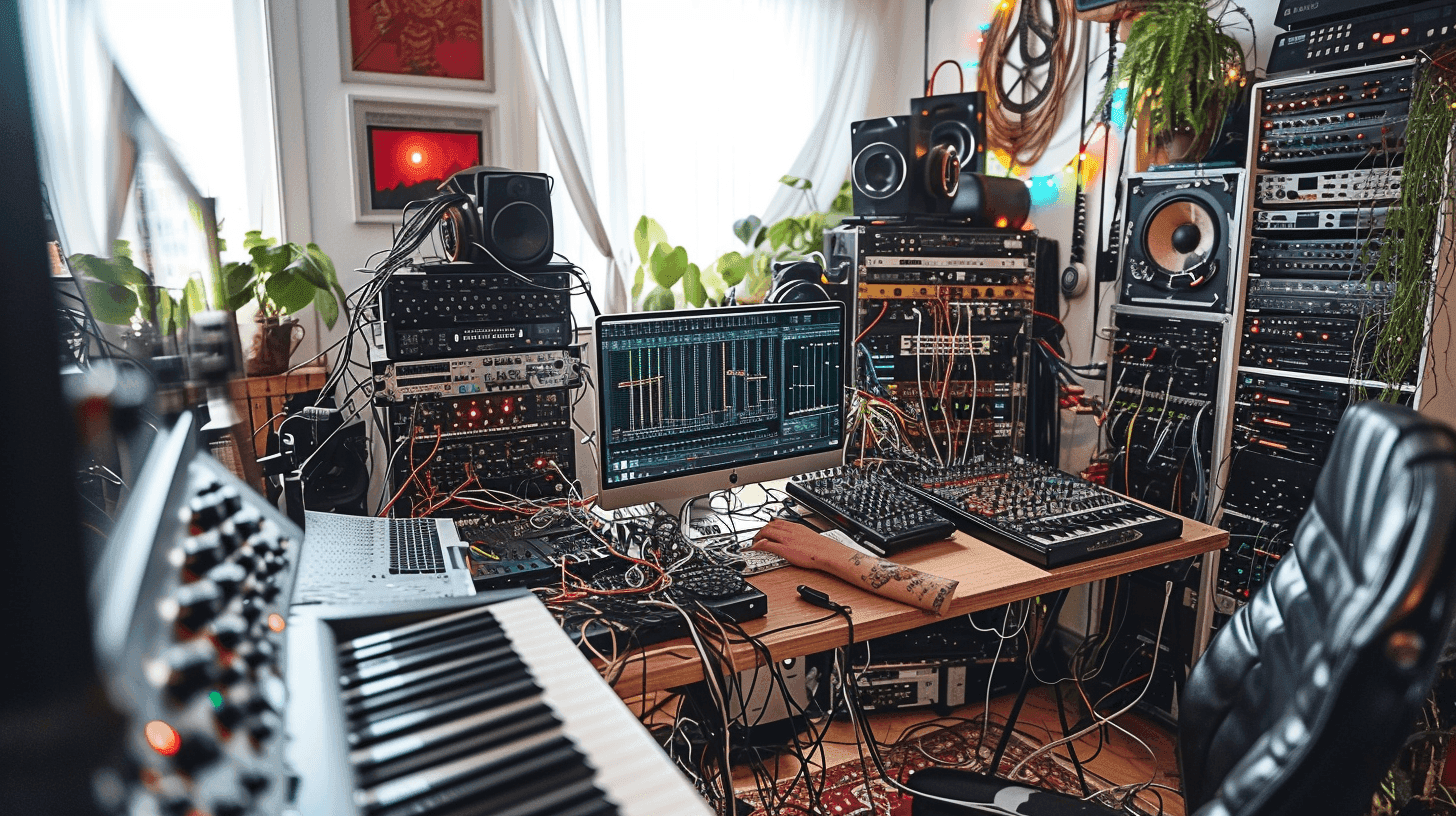
The Authenticity Debate
At the heart of the conversation about AI in music is the question of authenticity. Can a track mastered by AI convey the same emotional depth as one refined by human ears? While 22% of music producers have embraced AI for mastering, others worry that the human touch may be lost in translation. The subtleties of a piece of music—its dynamics, timbre, and emotional resonance—have traditionally been shaped by the artist's intuition and experience. It remains to be seen whether AI can truly replicate these human qualities.
The Emotional Connection
Music is an art form that thrives on connection—between the artist and their creation, and between the creation and the listener. AI-generated vocals and compositions may be technically proficient, but some argue that they lack the soul of human-generated content. The complexity of human emotion, often conveyed through music, could be diminished if AI cannot capture the same depth of feeling.
Job Security for Musicians
There's also the concern for job security among musicians and session singers. If AI can produce vocals and compositions that are on par with those of humans, what does that mean for the livelihoods of these artists? The music industry has long been a competitive space, and the introduction of AI could exacerbate this, potentially reducing the demand for human performers.
Ethical Implications
Beyond the practical considerations, there are ethical implications to consider. The use of AI to generate music raises questions about copyright and ownership. Who owns a piece of music created by AI? And what rights do session singers or voice actors have when their voices are cloned? These are questions that the industry will need to navigate carefully.
The Human Element
Despite these concerns, there's a strong argument to be made for the human element in music production. Music is not just about sound; it's about storytelling, expression, and the human experience. While AI can enhance the technical aspects of production, it may never replace the creativity and emotional input that humans bring to the process.
Preparing for the AI Wave in Vocal Production
For music producers, the rise of AI presents both challenges and opportunities. To harness the potential of AI while addressing the concerns, producers need to stay informed and adapt their skills accordingly.
Understanding AI Capabilities
Producers should familiarize themselves with the capabilities and limitations of AI in music production. This includes understanding how AI can be used to generate vocals, master tracks, and even compose music. By doing so, they can make informed decisions about when and how to integrate AI into their projects.
Balancing AI and Human Talent
The key to successful integration of AI may lie in finding the right balance between technology and human talent. Producers can use AI to handle certain tasks while still relying on human musicians for aspects of production that require a personal touch. This hybrid approach could lead to a new era of music that leverages the best of both worlds.
Navigating Ethical Waters
Producers must also navigate the ethical considerations of using AI. This includes respecting copyright laws, ensuring fair compensation for human artists, and considering the implications of voice cloning. As the technology evolves, so too must the industry's ethical standards.
Staying Ahead of the Curve
To remain competitive, producers need to stay ahead of the curve. This means keeping up with technological advancements, experimenting with new AI tools, and continuously refining their craft. By doing so, they can position themselves at the forefront of this evolving industry.
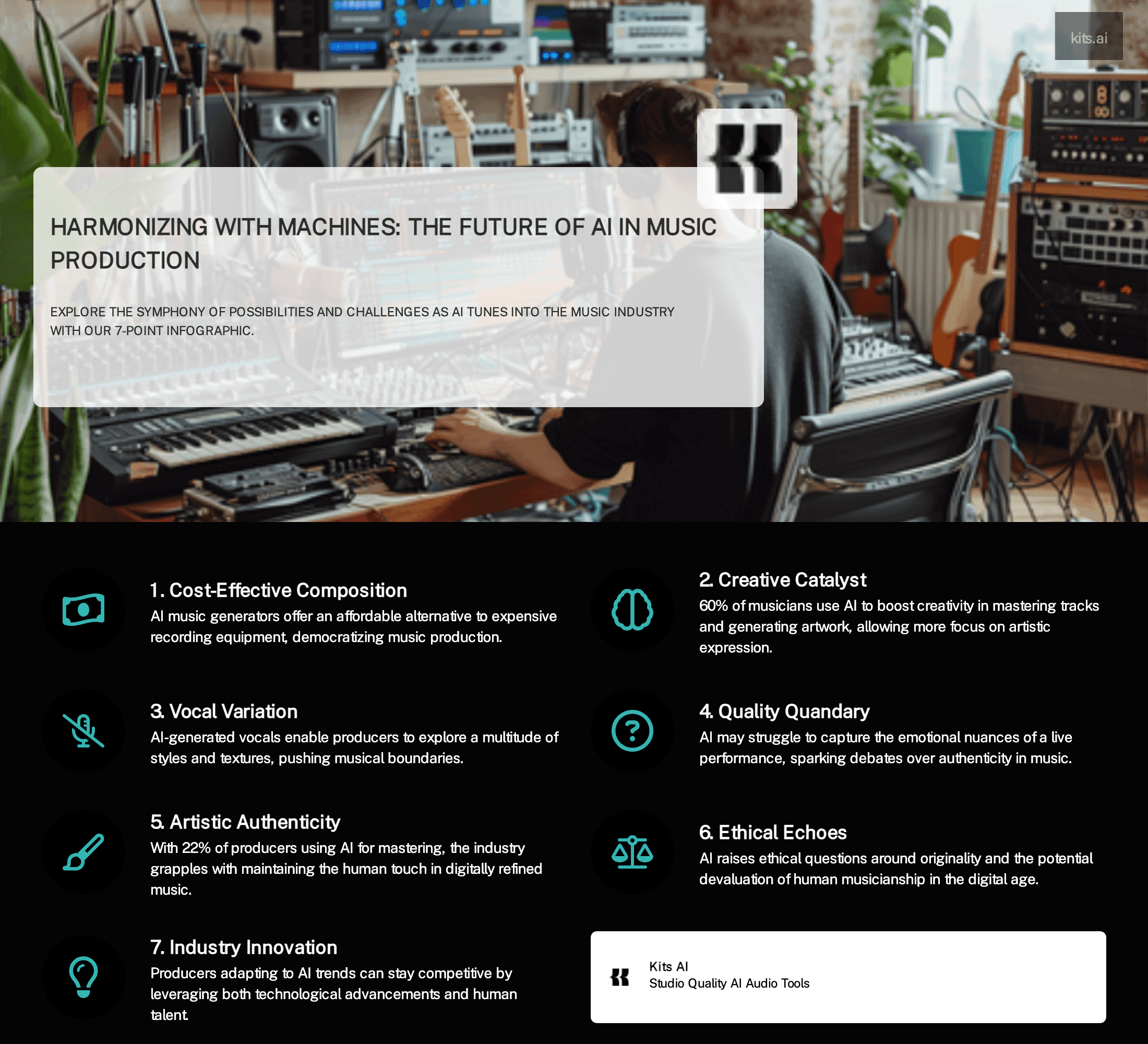
Conclusion
AI in music production offers a wealth of possibilities for enhancing creativity, reducing costs, and democratizing the music-making process. At the same time, it presents challenges that must be addressed with care and consideration. For producers, the advent of AI means adapting to change, embracing new tools, and finding ways to maintain the human element that is at the heart of great music. As we move forward, the music industry will undoubtedly continue to evolve, and with it, the role of AI in shaping the sounds of the future.
